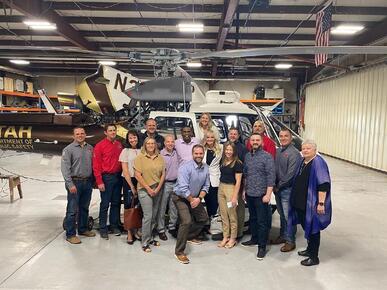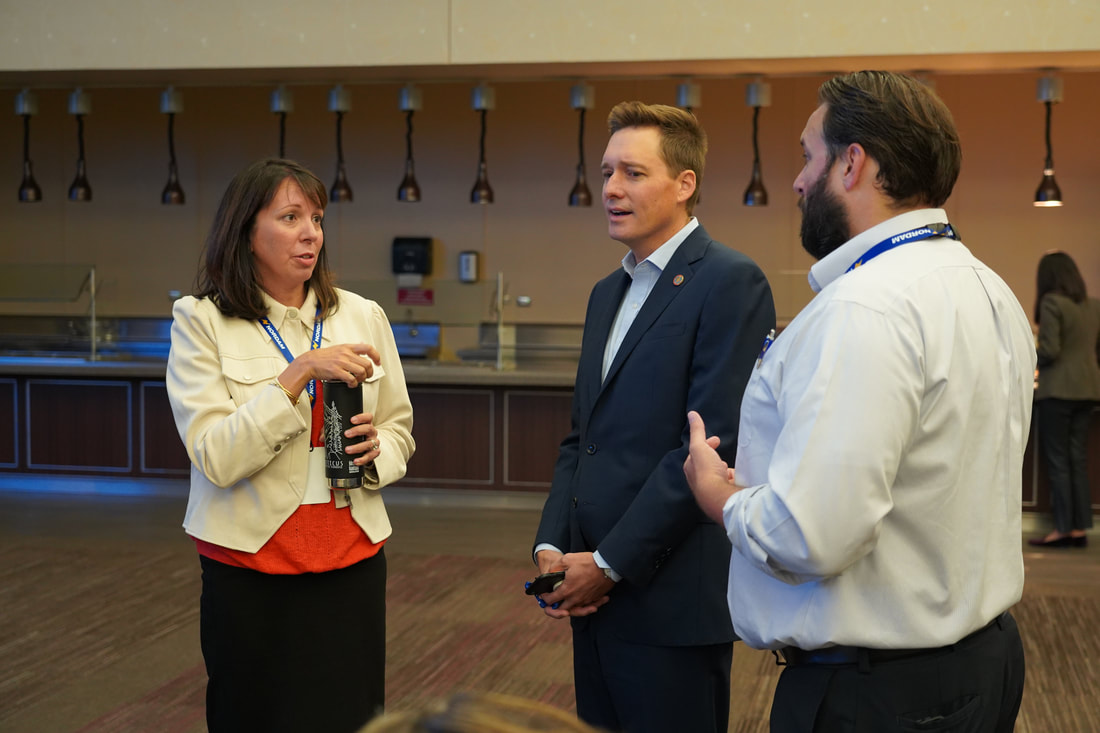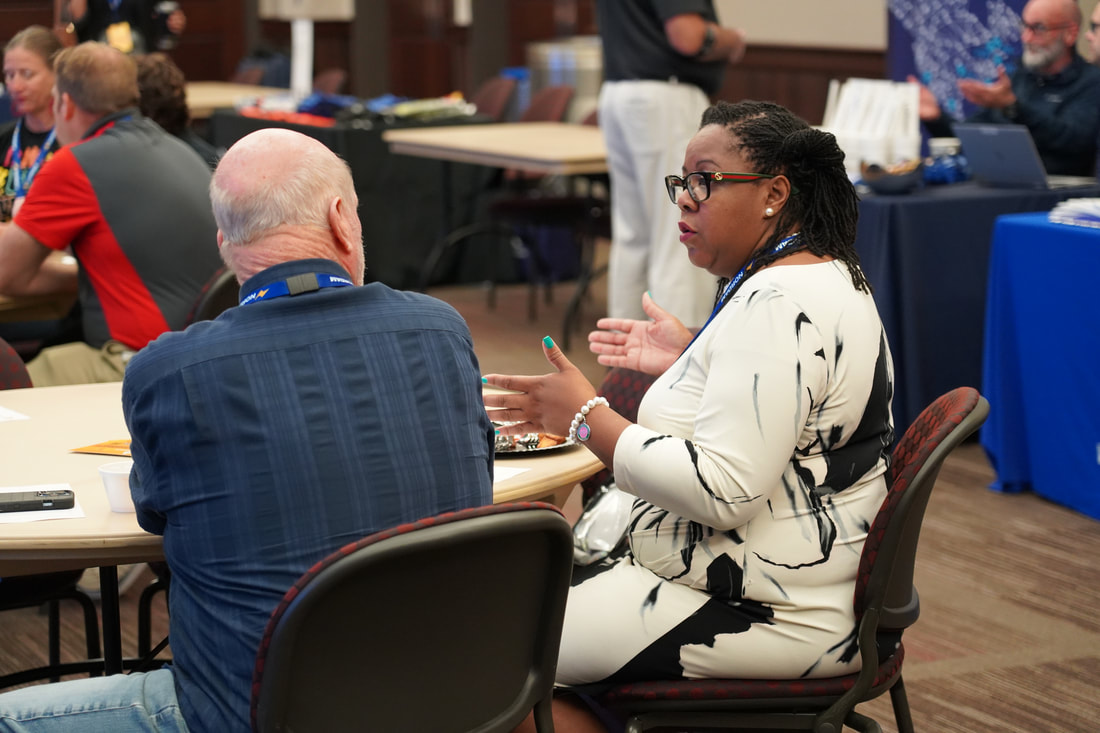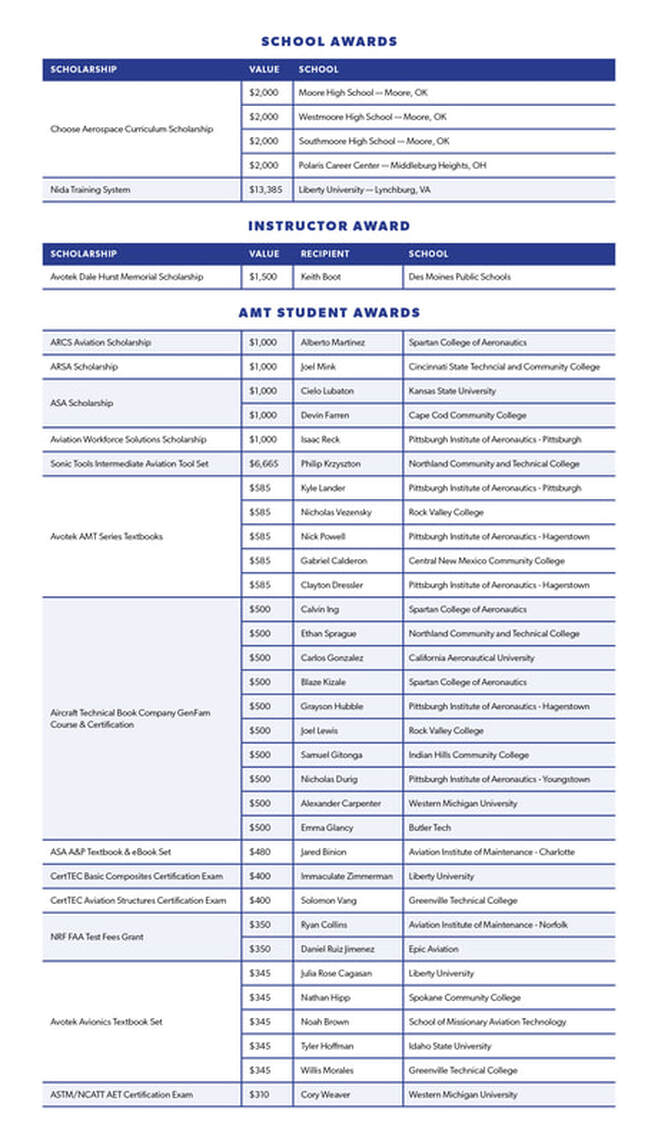|
Artificial intelligence and virtual reality will play key roles in training the aviation maintenance technician of tomorrow. Choose Aerospace is part of a recently formed industry consortium that will study beneficial ways to apply the technology and develop specific tools based on its research.
The effort is backed by a $2 million research grant from the National Science Foundation awarded to project leader Clemson University. Choose Aerospace will work along with Clemson and participants Purdue University, Southern Illinois University, Greenville Technical College, SA Technologies, NSF National Center for Autonomous Technologies, Aviation Technician Education Council, Frontier Airlines, AAR, Republic Airways, Atlas Air, Stevens Aerospace, Vericor, AMFA, and Lockheed Martin. Choose Aerospace's specific roles include forging a partnership network with aviation maintenance industry stakeholders and provide guidance on the development and refinement of aviation maintenance education resources and a hybrid curriculum that can leverage the new tools. Examples of the tools could include virtual-reality headsets that allow a technician to "see" an engine and conduct repairs without ever leaving a classroom. Such tools augment hands-on aspects of technical training by providing cost-effective ways to learn and practice skills. "A sustainable, diverse workforce pipeline is more than just people," said Choose Aerospace Executive Director Crystal Maguire. "Access to the most advanced tools and technology will play key roles in ensuring tomorrow's maintenance technicians are prepared to meet the demands of a fast-growing industry. Choose Aerospace is excited to work with such a diverse group of partners and support Clemson University's efforts."
0 Comments
Business aviation maintenance specialist West Star Aviation is launching an innovate maintenance technician training academy, leveraging Choose Aerospace's baseline training and Southwestern Illinois College's Part 147 curriculum to create a career onramp for aspiring mechanics.
The West Star Aviation Academy (WSAA) program will launch with 25 apprentices spending 7.5 months on a combination of course work and hands-on training. The lessons will blend Choose Aerospace's curriculum, Southwest Illinois' FAA-approved curriculum and West Star's proprietary training. The WSAA apprenticeship program timeline is significantly shorter than industry's typical 18-30-month program, and candidates are paid during their training. West Star's approach is one example of how Choose Aerospace can help create a pipeline for aspiring mechanics--from high school students to transitioning military members--to obtain the skills needed for becoming a certified airframe and powerplant technician. For more details on WSAA, see https://www.weststaraviation.com/news/in-house-academy/. Strengthening and expanding a blossoming workforce-development program that links high school students and major aviation companies was the focus of a half-day summit at participant Tulsa Tech's Owasso Campus on October 13. The "Industry In Service" event spotlighted participants in Choose Aerospace, an aerospace workforce pipeline development program that prepares high school students and others to become certified aviation maintenance professionals. Oklahoma, with 12 of the 21 educational institutions that have signed on, is leading the way in the fledgling program's development. Three of the 12 Oklahoma participants are in the Tulsa metro area: Sand Springs High School, Okmulgee High School, and Tulsa Public East Central High School. Representatives from these schools and other Tulsa-based institutions were on hand along with local executives from several companies that support Choose Aerospace, including American Airlines, The NORDAM Group LLC, Lufthansa Technik, and Spirit AeroSystems. The summit's goal was to share best practices and generate more interest among schools and communities as part of a broader workforce development effort. Oklahoma Lieutenant Governor Matt Pinnell kicked off the summit, spotlighting the state's commitment to workforce development at the highest levels. “The second largest, most powerful, influential industry in the state of Oklahoma is our aerospace industry,” said Pinnell. “We've got to tell kids, and working adults for that matter, in all 77 counties that there are amazing opportunities when it comes to aviation and aerospace. In this part of the state and across the state, we want to make Oklahoma the best place to choose aerospace.” The event was also supported by Tulsa Tech, the Tulsa Regional Chamber’s Aerospace Council, Oklahoma CareerTech and the Oklahoma Aeronautics Commission. Schools that adopt the Choose Aerospace curriculum offer students direct pathways to accredited aviation maintenance schools or apprenticeships with aircraft manufacturers, airlines, and maintenance providers. Such pathways are seen as a key to developing and diversifying the workforce in the rapidly expanding U.S. aviation industry. As one of the U.S.'s largest and most well-developed aerospace business regions, Oklahoma is an ideal area for the program to blossom and serves as an example of how to develop focused, sustainable aviation career pipelines. For more information, visit chooseaerospace.org/curriculum. ### Choose Aerospace is a partnership of aerospace stakeholders including companies, associations, labor unions and education institutions, joined to address the availability of a diverse, qualified technical workforce and to spur interest in aerospace careers, and identify and implement solutions to the aerospace workforce shortage. A primary objective for Choose Aerospace is to make aerospace career and technical training a priority in secondary schools and to provide multiple career paths to success within the industry. From left to right: Choose Aerospace Executive Director Crystal Maguire, Oklahoma Lieutenant Governor Matt Pinnell, and American Airlines Workforce Development and Strategy representative Chase Beasley discuss state-based aviation workforce development initiatives ahead of Pinnell’s remarks at the Choose Aerospace In Service event. Industry and educators, including The NORDAM Group LLC Director of Corporate Social Responsibility and Communication Mandy Monahan, network and discuss aviation pathway programs at the Choose Aerospace In Service event.
This morning, ATEC Executive Director Crystal Maguire presented a briefing for part 147 programs on how they can utilize the Choose Aerospace aviation maintenance curriculum to grow enrollment of their A&P program. The webinar gave an overview of the curriculum, how and why it was created, and reviewed commonly asked questions (as set forth on our Q&A page).
If you missed the live version, you can still check out the 45-minute recorded version, below. You can also download the slide deck here. Oklahoma CareerTech programs in high schools and technology centers now have access to free aviation maintenance technical curriculum. The Oklahoma Department of Career and Technology Education recently signed a contract with Choose Aerospace to provide the curriculum to any school in the state that decides to deploy an aviation maintenance program. “At CareerTech, what we work off of is demand,” said Brent Haken, Oklahoma CareerTech state director. “We don’t create a supply of workforce; we create a workforce because of the demand that’s out there in the industry, and that’s why Oklahoma CareerTech is so strong, why we’ve been so nimble, and that’s what we’re doing in the aerospace industry.” Aerospace is the No. 2 industry in Oklahoma, Haken said, but there is a growing need for more certified mechanics. According to the Aviation Technician Education Council, the current pipeline will need to increase by 20% across the country to meet the national need for Federal Aviation Administration (FAA) certificated mechanics.
“Oklahoma CareerTech is working to meet those needs through Choose Aerospace,” Haken said. “We are working right now to make sure every CareerTech school has licenses for any student that’s enrolled in those programs and wants to take part in Choose Aerospace. We’re going to make sure that happens through the Department of CareerTech,” he said. “The program was created to fill a very specific need,” said Choose Aerospace president and AAR Vice President Workforce Development Ryan Goertzen. “Student that graduate from the program have the opportunity to go directly to work as a non-certificated technician, or matriculate into an FAA-certificated school to finish their airframe and powerplant training.” The funding is part of the mission to remove barriers to adoption, said Goertzen. “We work very closely with state governments and industry supporters to ensure that cost is never the reason a high school declines to start an aviation maintenance program. “A few Oklahoma schools used the Choose Aerospace curriculum last year at a cost of $200 per student,” said Tonja Norwood, manager of the science, technology, engineering and mathematics education division at Oklahoma CareerTech. “Now it will be free, so schools can teach the curriculum at no cost.” Oklahoma CareerTech is paying for the curriculum with federal grant money received through the Strengthening Career and Technical Education for the 21st Century Act. The act, commonly called Perkins V, is designed to provide students across the country with opportunities to develop skills and earn certifications that will help them advance in their careers. The CareerTech STEM division has worked with Choose Aerospace to approve the coursework for Oklahoma’s Promise credit. High schools expected to teach the curriculum in the state of Oklahoma include Broken Arrow Public Schools, Chelsea High School, Moore Public Schools, Putnam City Schools, and Yukon Public Schools. The 2022-23 academic year saw the first cohort of Choose Aerospace students across the country. Sixteen schools enrolled two hundred students last year, that number is expected to double for the 2023-24 academic year. For more information, visit chooseaerospace.org/curriculum. About Oklahoma CareerTech The Oklahoma Department of Career and Technology Education provides leadership and resources and assures standards of excellence for a comprehensive statewide system of career and technology education. The system offers programs and services in 29 technology center districts operating on 60 campuses, 391 PK-12 school districts, 17 Skills Centers campuses that include three juvenile facilities and 32 adult education and family literacy providers. The agency is governed by the State Board of Career and Technology Education and works closely with the State Department of Education and the State Regents for Higher Education to provide a seamless educational system for all Oklahomans. About Choose Aerospace Choose Aerospace is a year-old partnership of aerospace stakeholders including companies, associations, labor unions and education institutions, joined to address the availability of a diverse, qualified technical workforce and to spur interest in aerospace careers, and identify and implement solutions to the aerospace workforce shortage. A primary objective for Choose Aerospace is to make aerospace career and technical training a priority in secondary schools and to provide multiple career paths to success within the industry. Last month, Choose Aerospace hosted an outreach event in conjunction with a two-day teacher training in Tulsa. The outreach meeting discussed topics including implementation of the curriculum into local high schools as well as an Aviation Showcase where industry partners took time to talk with schools in attendance about job opportunities available to students completing the curriculum. Over 70 attendees representing 20 schools were in attendance. Employers that were showcased included AAR, American Airlines, Tinker Airforce Base, Nordam, TAT Limco Airepair, Computer System Designers, United Airlines, Air Force Sustainment Center, Oklahoma City Air Logistics Complex, and Southwest Airlines. Check out this video and slides from the meeting. The outreach meeting was followed up by two days of training for teachers enrolled in the curriculum to include an overview of the instructor dashboard and best practices, as well as new hands-on projects to be implemented into the curriculum beginning this fall. Special thanks to the following ATEC A&P instructors for building and training on hands-on projects:
Thanks to generous donors, schools were placed in a drawing for prizes that will aid in the hands-on aspects of their program. Spring Valley High School out of West Virginia was the winner of a toolbox provided by Snap-on, and Putnam City North High School out of Oklahoma was the winner of a safety wire box donated by the Aerospace Maintenance Council. Each school in attendance was also given a set of Sonic Tools screwdrivers, provided by AAR. During the awards luncheon at the ATEC Annual Conference in Chicago, IL, thirty-two students, one instructor, and five schools were recognized as this year's recipients for the Choose Aerospace Scholarship Program. Over $45,000 in licensing fees, training systems, cash awards, books, testing fees and more were awarded. A big thank you to all the donors for making it possible, and congratulations to the recipients.
Choose Aerospace will provide over $40,000 worth of scholarships, textbooks, training systems, tools, and testing fee credits to educators and future aviators.
The non-profit organization, managed by the Aviation Technician Education Council, is in its fourth award season. This year's donors include Aeronautical Repair Station Association, Aviation Supplies & Academics (ASA), Nida Corporation, AVOTEK, Aircraft Technical Book Company, CertTEC, Sonic Tools, and Northrop Rice Foundation. Newcomers this year are ARCS Aviation and Aviation Workforce Solutions, each providing cash awards. Choose Aerospace has shifted gears with their award and for the first time will be awarding $2,000 to two high schools that are interested in implementing the Choose Aerospace Curriculum. The scholarship will cover licensing fees for 10 students for one year. Eligible applicants must be planning to attend, enrolled at or teach in an aviation technical program. ATEC membership is not required but is a consideration for the review committee when selecting award recipients. The deadline to apply is February 15, 2023. If you or someone you know would like to serve on the review committee, please email [email protected].  As part of its ongoing effort to further aviation technical education, Choose Aerospace Executive Director Crystal Maguire joined Helicopter Association International (HAI), Southern Utah University, and other Utah-based educators, operators, and government stakeholders for an Aviation Workforce Development Roundtable in Salt Lake City, Utah. The event, organized by US Representative Burgess Owens (R-UT-4), discussed ways to build on the success of HAI's Utah Rotor Pathway Program, an initiative created to address the shortage of helicopter pilots and maintenance professionals. The purpose of the roundtable, hosted by the Office of Aeronautics Division of the Utah Department of Transportation, was to identify federal resources available to support aviation workforce efforts. HAI's Rotor Pathway Program brings together industry, universities, and high schools to provide helicopter pilot and maintenance training at the high school level. Choose Aerospace was happy to join the conversation to share curriculum resources available to high school programs that wan to create aviation maintenance pathways for their students. As of today, 17 schools and 580 students are utilizing the Choose Aerospace aviation maintenance curriculum, putting individuals on a direct path to careers in aviation maintenance. Choose Aerospace was on of 56 recipients across Oklahoma to receive funding from the Oklahoma Aeronautics Commission (OAC), intended to help guide young minds toward aerospace and aviation careers. The funding will cover licensing fees for select Oklahoma schools adopting the Choose Aerospace curriculum.
The OAC has become a driving force behind the state’s investment in aerospace educational programs, vectoring students toward becoming aviators, engineers, mechanics, astronauts, and scientists. Fifty-six organizations were awarded Aerospace and Aviation Education Program grants totaling $451,157. Grants are for targeted learning programs that have a direct application to aerospace and aviation for primary through post-secondary education. The grant funds are part of the agency’s initiative to give more Oklahoma young people access to STEM careers in the aerospace and aviation industry. The agency’s Aerospace and Aviation Education Grant Program has been awarding aerospace and aviation education grants for over 30 years. Programs that are supported range from a dedicated 4-year high school curriculum such as the AOPA “You Can Fly” effort, to week-long summer camps offered by our major Universities, a build and fly drone racing competition, Tinker AFB Air and Space Show, a 2-year high school curriculum dedicated to teaching aircraft mechanics, activities and tours at various airports across the system, engineering fairs and many others. These programs along with Commission staff will help foster students’ interest in the industry and encourages them to consider aerospace or aviation as a career. Based on projections, the programs that have been awarded funding will reach nearly 50,000 students across the state. The initiative supports the Oklahoma Works project that aims to address the skills gap and connect students to programs that will help build the workforce of Oklahoma’s second-largest industry. |
Archives
June 2024
Categories |
|
|
© 2024 Choose Aerospace, Inc.
501(c)(3) non-profit [email protected] • 888.262.2367 P.O. BOX 234 • JENKS, OK 74037 |



 RSS Feed
RSS Feed